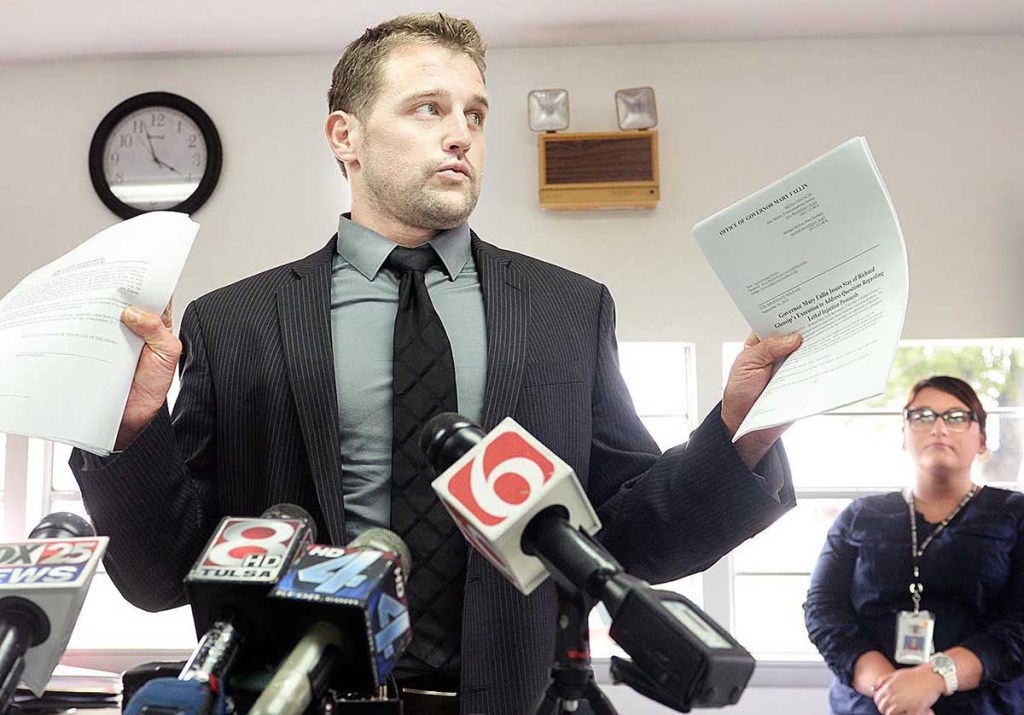Gov. Mary Fallin issues stay of execution for Oklahoma inmate
Published 5:00 pm Wednesday, September 30, 2015

- Alex Gerszewski, public information officer for the Oklahoma Department of Corrections, speaks to reporters shortly before the planned execution of Richard Glossip was delayed by Oklahoma Gov. Mary Fallin.
Richard Glossip’s execution was stayed Wednesday by Oklahoma Governor Mary Fallin.
After the Supreme Court announced it would not stop the execution, Fallin decided to intervene, saying she wanted to examine the state’s execution protocol.
“Last minute questions were raised today about Oklahoma’s execution protocol and the chemicals used for lethal injection,” Fallin said in a press release. “After consulting with the attorney general and the Department of Corrections, I have issued a 37 day stay of execution while the state addresses those questions and ensures it is complying fully with the protocols approved by the United States Supreme Court.”
Fallin’s spokesman, Alex Weintz, said someone — he didn’t know who — raised a question “very shortly before the execution” about one of the drugs the state had obtained to execute Glossip. The Department of Corrections received the drugs Wednesday — the same day as the planned execution — and as soon as staff realized they had received potassium acetate, they contacted the state’s Attorney General’s Office.
“I think it had never occurred to the people involved with implementing the execution that anyone would consider these drugs were different,” Weintz said, adding that the two drugs are “extremely similar in their chemical composition.”
“I would hope that people understand the state of Oklahoma takes its role in implementing the death penalty extremely seriously,” he said. “We want to do it right, we want to do it legally. We want to follow the letter of the law. We want to use the protocols that have been approved by the Supreme Court.”
He said Fallin is frustrated that “we haven’t been able to deliver closure for the Van Treese family.”
Glossip, 52, convicted of orchestrating a 1997 Oklahoma City murder, Glossip was set to die at 3 p.m. today. The Oklahoma Department of Corrections announced Fallin’s move in a statement at about 4 p.m.
Last month, Fallin said she had no plans on halting Glossip’s execution and made no effort to issue a 60-day stay under her own authority, saying she believes he’s guilty of murder.
The state court of appeals delayed Glossip’s execution Sept. 16 when it agreed to review new evidence his attorneys said cast doubt on his guilt. His attorneys cited new witnesses who claimed Glossip had been set up and tied to the 1997 murder.
Following the initial denial of Glossip’s appeal on Monday, Glossip attorney Mark Henricksen said he planned to file a petition with the nation’s highest court, as reported by news affiliate KOCO.
In the days since, Glossip’s attorney’s have filed motions before the United States Supreme Court asking for a stay and urging for further review of the murder case. They also continue to urge the governor for a 60-day pause.
This summer, Glossip’s case drew international attention, most notably when actress Susan Sarandon appeared on the Dr. Phil show to make her case as to why she believes Glossip shouldn’t be executed.
Other high-profile advocates include long-time Oklahoma University football coach Barry Switzer, former United States Sen. Tom Coburn and well known anti-death penalty advocate Sister Helen Prejean who appeared on television alongside Sarandon and met with Glossip prior to his stayed execution on Set. 16.
During his recent six-day visit to the U.S. where he spoke at length on the death penalty, Pope Francis has asked for a reprieve on Glossip’s behalf, pleading with Fallin to spare the man’s life. According to NBC News, the pope’s representative asked Fallin to commute Glossip’s death sentence in a Sept. 21 letter, saying that would “give clearer witness to the value and dignity of every person’s life.”
A spokeswoman for Fallin told NBC News the governor does not have the authority to commute the sentence.
In the hours leading up to his execution, area law enforcement officials told the McAlester (Oklahoma) News-Capital that multiple bomb threats were lodged today, some against the Oklahoma State Penitentiary facility. The Oklahoma Department of Corrections declined comment on the threats other than to say the execution was scheduled to move forward as planned.
The last-minute developments Wednesday left Glossip’s defense attorneys in shock. They were thankful Glossip’s execution was stayed but they said they were deeply troubled the state was so close to executing a man with a substituted drug.
“(The state) never told us it was substituting potassium chloride with this other drug,” said Dale Baich, a federal public defender who has helped work on Glossip’s case.
“All we know is that the third drug potassium chloride was substituted with a different drug,”Don Knight, defense attorney for Glossip, said.
Glossip’s family was overjoyed.
“We all started crying, laughing, just happy,” said Glossip’s daughter, Ericka Glossip-Hodge.
Glossip-Hodge had gathered in front of the prison with a group of protesters and family members. The group prayed for a last-minute intervention even after the U.S. Supreme Court had declined to step in. Suddenly, Fallin announced she’d intervened.
“Absolutely thrilled,” said Glossip’s sister, Kathy Wokaty. “We wondered. The clock just kept on ticking.”
Glossip’s execution has been delayed at least three times. His new execution date is scheduled for Nov. 6.
The McAlester (Oklahoma) News-Capital contributed details to this story.

